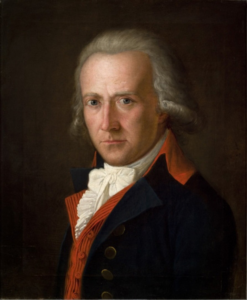The evening
(Poet's title: Der Abend)
Set by Schubert:
D 108
[April 1814]
Purpur malt die Tannenhügel
Nach der Sonne Scheideblick,
Lieblich strahlt des Baches Spiegel
Hespers Fackelglanz zurück.
Wie in Totenhallen düster
Wird’s im Pappelweidenhain,
Unter leisem Blattgeflüster
Schlummern alle Vögel ein.
Nur dein Abendlied, o Grille,
Tönt noch aus betautem Grün
Durch der Dämmrung Zauberhülle
Süße Trauermelodien.
Tönst du einst im Abendhauche,
Grillchen, auf mein frühes Grab
Aus der Freundschaft Rosenstrauche
Deinen Klaggesang herab:
Wird noch stets mein Geist dir lauschen,
Horchend, wie er jetzt dir lauscht,
Durch des Hügels Blumen rauschen,
Wie dies Sommerlüftchen rauscht.
The pine-covered hill is painted crimson
After the departing glance of the sun;
Lovingly the mirror of the brook
Reflects Hesperus’ bright torch.
It is becoming as gloomy as burial vaults
In the groves of poplars;
Under the gently whispering leaves
All the birds fall asleep.
Only your serenade, cricket,
Can still be heard out of the dewy green;
Through the magical cover of dusk
Resound sweet mournful melodies.
If ever you sing in the evening breath,
Cricket, over my early grave,
Out of the rosebush planted by friends
Raising your lament,
My spirit will always listen to you,
Paying attention to you as now
Rustling through flowers on the grave
Like the rustling of this summer breeze.
All translations into English that appear on this website, unless otherwise stated, are by Malcolm Wren. You are free to use them on condition that you acknowledge Malcolm Wren as the translator and schubertsong.uk as the source. Unless otherwise stated, the comments and essays that appear after the texts and translations are by Malcolm Wren and are © Copyright.
☙
Themes and images in this text:
Birds Crickets Dew Evening and the setting sun Farewell and leave taking Flowers Gazes, glimpses and glances Graves and burials Green Hesperus, the evening star (Venus) Laments, elegies and mourning Leaves and foliage Magic and enchantment Melody Mirrors and reflections Pine trees Poplars Red and purple Rivers (Bach) Roses and pink Serenades and songs at evening Summer Surface of the water Sweetness Wind Woods – groves and clumps of trees (Hain)
As the darkness intensifies and the silence becomes more noticeable our senses seem to be more acute. The hitherto unnoticed light of Venus begins to burn like a torch even when it is only a reflection in the stream. As the birds fall silent in the poplars the chirping of the cricket seems to get louder. This is the magic of dusk. By plunging our world into darkness and silence it uncovers the sights and sounds that had previously been crowded out of our awareness.
The poet compares the darkness amongst the poplars to the darkness of a funeral vault, but this cannot be total darkness (we need a few photons at least to register the similarity between the trunks and the pillars, the branches and the vaulting). Nor is the early grave that the poet anticipates a truly anechoic chamber (the sort of environment from which even sounds below 0 decibels, the supposed limit of human hearing, are excluded). When the sun sets for him and darkness and silence fall he will be all the more aware of the sound of the cricket as it reverberates in the flowers on his grave. Sunset does not signify an end to perception but an intensification of it.
☙
Original Spelling Der Abend. 1778 Purpur malt die Tannenhügel Nach der Sonne Scheideblick, Lieblich strahlt des Baches Spiegel Hespers Fackelglanz zurück. Wie in Todtenhallen düster Wirds im Pappelweidenhain, Unter leisem Blattgeflüster Schlummern alle Vögel ein. Nur dein Abendlied, o Grille! Tönt noch aus bethautem Grün, Durch der Dämmrung Zauberhülle Süße Trauermelodien. Tönst du einst im Abendhauche, Grillchen, auf mein frühes Grab Aus der Freundschaft Rosenstrauche Deinen Klaggesang herab: Wird noch stets mein Geist dir lauschen, Horchend wie er jetzt dir lauscht, Durch des Hügels Blumen rauschen, Wie dies Sommerlüftchen rauscht!
Confirmed by Peter Rastl with Schubert’s source, Gedichte von Matthisson. Neueste verbesserte Auflage. Wien und Prag bey Franz Haas 1810. pages 178-179; with Gedichte von Friedrich von Matthisson. Erster Theil. Tübingen, bei Cotta, 1811, pages 29-30, and with Gedichte von Matthisson. Fünfte vermehrte Auflage. Zürich, bei Orell, Füssli und Compagnie. 1802, pages 213-214.
The first edition (Dessau, 1783) has the correct creation date (1780) and an additional (fourth) stanza which was left out in later editions:
Singt das bange Herz in Schlummer, Hemmt der Zähren wilden Lauf, Lös't der Liebe tiefsten Kummer Selbst in stille Wehmuth auf!
To see an early edition of the text, go to page 178 [186 von 296] here: http://digital.onb.ac.at/OnbViewer/viewer.faces?doc=ABO_%2BZ169509602


